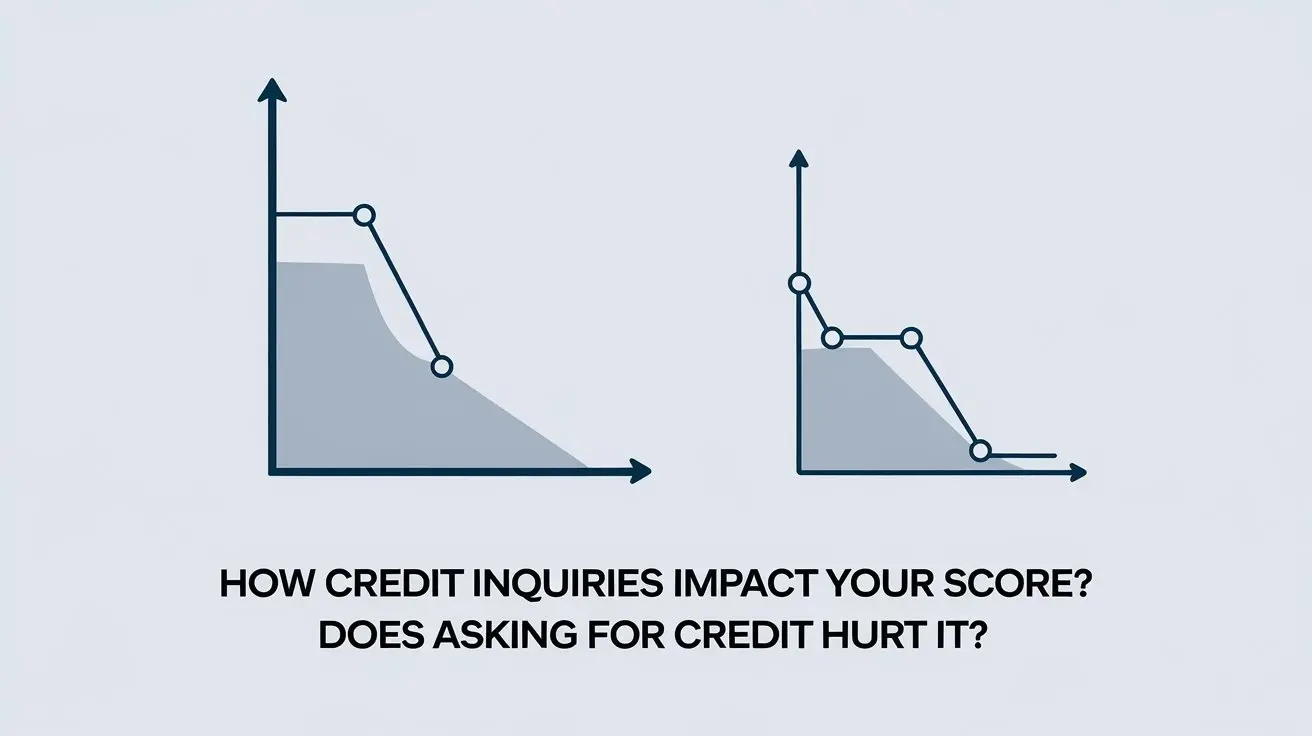-
Posted on: 04 Dec 2024

-
Credit inquiries are an essential part of your financial life, and understanding how they affect your credit score is crucial to maintaining a healthy financial profile. Every time you apply for a new credit card, mortgage, or loan, a lender typically reviews your credit report, which results in a "credit inquiry." However, there’s often confusion about whether these inquiries can hurt your credit score, and if so, by how much.
This blog post aims to answer the critical question: Does asking for credit hurt your score? We’ll take a close look at the different types of credit inquiries, their impact on your credit score, and how to manage them effectively.
What Are Credit Inquiries?
Credit inquiries refer to requests made by financial institutions or creditors to review your credit report when you apply for a new line of credit or loan. There are two types of credit inquiries: hard inquiries and soft inquiries.
-
Hard Inquiries: These occur when a lender or creditor reviews your credit report to decide whether to approve your application for a loan or credit card. For instance, when you apply for a mortgage, car loan, or credit card, the lender will likely perform a hard inquiry.
-
Soft Inquiries: These occur when a lender checks your credit report for reasons other than evaluating a credit application. Soft inquiries happen when you check your credit score or if you receive a pre-approved credit offer. Importantly, soft inquiries do not impact your credit score.
The Different Types of Credit Inquiries
Hard Inquiries
Hard inquiries are the type of inquiries that may affect your credit score. Each hard inquiry can cause a slight dip in your score, usually around 5 to 10 points, depending on your overall credit history. However, the impact is generally temporary. Hard inquiries remain on your credit report for up to two years, but they typically only affect your score for about a year.
Hard inquiries often occur when you apply for a mortgage, credit card, or personal loan. Although a single hard inquiry isn’t usually a significant threat to your score, multiple inquiries in a short period can suggest to lenders that you may be taking on more debt than you can handle, which could lead to a lower score.
Soft Inquiries
Soft inquiries, in contrast, do not affect your credit score. These occur when you check your credit, when a lender reviews your credit for pre-qualification, or when a company checks your credit as part of a background check. Since soft inquiries aren’t linked to a specific credit application, they don’t indicate any increased credit risk and, therefore, have no impact on your score.
Does Asking for Credit Hurt Your Score?
When you apply for a new credit line, the lender typically performs a hard inquiry. But how much does this hurt your credit score? The answer varies depending on your credit history and how many inquiries you have.
Impact of Hard Inquiries on Your Credit Score
A single hard inquiry typically causes a small decrease in your score, often around 5 to 10 points. While this can affect your score, the impact is usually temporary. For individuals with a high credit score, the effect may be even less noticeable. However, for people with a lower score or a limited credit history, the impact may be more significant.
Factors That Influence the Impact of Credit Inquiries
The impact of a credit inquiry depends on several factors, including:
-
Credit history: The longer and stronger your credit history, the less impact a single hard inquiry will have. Conversely, if you have a shorter or less established credit history, an inquiry may cause a more noticeable dip.
-
Current credit score: If your credit score is already high, a hard inquiry may have little effect. However, if your score is lower or you’ve recently been making late payments, the inquiry may cause more damage.
-
Frequency of inquiries: Multiple inquiries within a short time frame—such as applying for several credit cards in a month—can raise red flags to lenders, suggesting that you may be taking on too much debt. This can hurt your credit score and reduce your chances of being approved.
Why Credit Inquiries May Not Be as Harmful as You Think?
Although hard inquiries can affect your score, the impact is generally small and temporary. Over time, your credit score should recover, especially if you focus on maintaining good financial habits.
Temporary Nature of the Impact
The effect of a hard inquiry on your credit score usually fades within a year. Although it stays on your credit report for up to two years, it only affects your score for a short time. Once the inquiry is more than a year old, it typically no longer impacts your score.
The Bigger Picture
A single credit inquiry is a small part of the overall picture of your financial health. Credit scores are determined by various factors, such as your payment history, credit utilization, and length of credit history. If you maintain responsible credit habits—like making timely payments and keeping your credit card balances low—then the temporary impact of an inquiry is unlikely to harm your score in the long run.
When Inquiries Can Be Helpful
In some cases, credit inquiries can be a sign of financial responsibility. For example, applying for a mortgage or auto loan and making timely payments can improve your credit score over time. Responsible use of credit can outweigh the small negative impact of a hard inquiry.
How to Minimize the Impact of Credit Inquiries?
While you can't completely avoid the effects of hard inquiries, there are several strategies you can use to minimize their impact:
Plan Your Credit Applications
If you know you’ll need to apply for credit soon, it’s important to space out your applications. Too many applications in a short period can make you appear desperate for credit and may significantly lower your score.
Shop for Credit Wisely
If you're rate shopping—for a mortgage, car loan, or student loan—make sure to do all your inquiries within a short window, typically between 14 and 45 days. Credit scoring models, like FICO, treat multiple inquiries for the same type of credit as one inquiry if they occur within this period, minimizing the impact on your score.
Review Your Credit Report Regularly
Regularly checking your credit report can help you spot any errors or fraudulent activities that could affect your score. If you notice any inaccuracies related to credit inquiries, make sure to dispute them promptly.
What to Do If You Have Multiple Hard Inquiries
If you’ve had multiple hard inquiries and your score has taken a hit, there are steps you can take to recover:
Focus on Good Credit Habits
The best way to rebuild your credit is by sticking to responsible financial practices. Pay your bills on time, keep your credit card balances low, and avoid taking on excessive debt.
Consider Credit Counseling
If you’re struggling with managing your credit, a credit counselor can help you navigate the process. They can offer advice and assistance in managing debt and improving your score.
Common Misconceptions About Credit Inquiries
There are several myths about credit inquiries that can confuse:
-
"Hard inquiries hurt your credit score forever": This is not true. While hard inquiries can cause a small, temporary drop in your score, they do not affect your score forever.
-
"Checking your credit hurts your score": This is also a myth. Since checking your credit is a soft inquiry, it does not impact your score in any way.
Conclusion
While credit inquiries can have a minor effect on your credit score, the impact is usually temporary and not as harmful as many believe. Understanding the difference between hard and soft inquiries, as well as how to manage your credit applications, can help you navigate the process with confidence. By focusing on long-term good credit habits, you can minimize the impact of credit inquiries and maintain a strong financial profile.
Say goodbye to bad credit—call (888) 803-7889 for expert assistance now!
-










